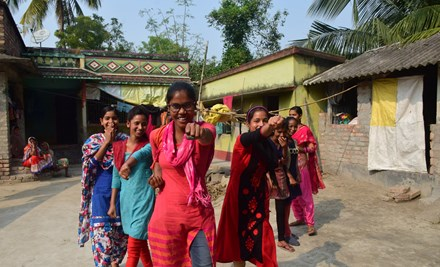
Meet the sponsored girls transforming their communities in 2022
Meet the sponsored girls transforming their communities in 2022
How sponsoring a girl can change the world
Violence, injustice, poverty, stigma, and cultural norms are just a few of the many obstacles girls must overcome in order to thrive.
Think you can’t make a difference?
By sponsoring a girl, you can help her overcome the barriers she faces.
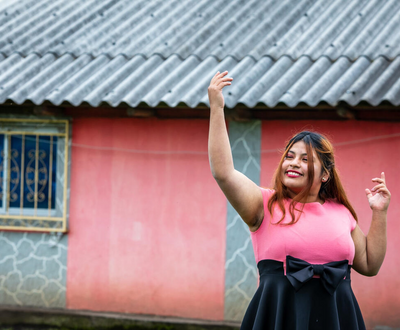
Genesis in Ecuador: breaking the bond of bullying
Genesis lives with her family in a small farming town near Ambato, Ecuador. It’s one of the poorest parts of the country, where many people don’t have access to healthcare, education, and clean water. Her family struggled to make ends meet. Then, when she was 10, Genesis experienced a sudden facial paralysis that disfigured her face and took over a year to heal. She was bullied at school, became significantly overweight, and was not able to see any hope for her future.
But then she joined World Vision’s child sponsorship programme. The family that sponsored her sent her letters of encouragement and love and their support helped her get school supplies and healthcare she needed to get back on track. Genesis also began participating in workshops and activities that shifted her thinking from what she couldn’t to what she could do, and gave her confidence to grow into an independent young woman. She slowly began to see herself just as her sponsors saw her— a person who is cared for and valued.
Today, now 14, she is confident, happy, and knows her rights. The girl who was once shy and bullied has blossomed into a karaoke star in her community. She has her sights on the future and wants to join the air force one day.
“My life has changed with sponsorship, the letters from my sponsor make me feel grateful and happy because through their words, they encourage me. I feel loved. The idea that I am going to fly in an airplane fills me with emotion: being in the clouds is my dream.”
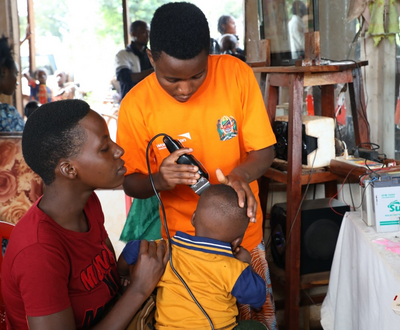
Dafroza in Tanzania: breaking the bond of gender stereotypes
It’s not common to see a girl cutting hair in a barbershop, but 15-year-old Dafroza is changing the norm in her community in Tanzania by doing just that. Dafroza was just a small child when she was forced to drop out of school due to health problems. But just because her formal education stopped, it didn’t extinguish her desire to learn and dream for her future.
Through World Vision child sponsorship, Dafroza built the confidence to chase her dreams. She began practising, by cutting her brothers’ hair using her father’s shaver. Word spread that their sister was doing their hair, and soon women in the community began bringing their boys to her for haircuts. But she wanted to learn more, so she begged her dad to take her to the local barbershop and let her learn. At first, he thought she meant the women’s salon, but when she corrected him, he was even more hesitant. Eventually, he spoke with the local barbershop owner to see if he would teach his daughter for six months — and he agreed. Today, Dafroza is a trained barber. She loves it, but that doesn’t mean it’s easy. She is not deterred, and one day she hopes to have her own shop. Dafroza’s father is proud of all she’s achieved.
“Whenever I went to cut my hair, I admired the barbers. I observed them; how [they used the] shaving machine. I wanted to be just like that. As a girl, one of the challenges of this work is disturbance from men. They want to take advantage of me. Sometimes women were not happy to see me shave their husband. Some men were not comfortable for me to shave them, but gradually they are accepting [it].”
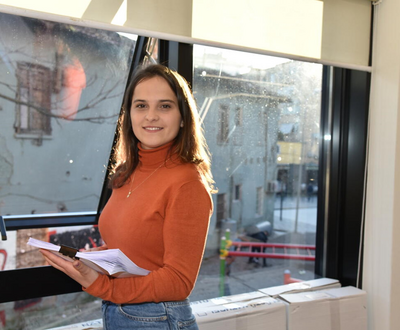
Artjola in Albania: breaking the bond of cultural expectations
“I wish I were a boy!” Artjola exclaimed to her mother when she was a little girl. Growing up in Albania, she saw that boys had more freedom than girls. She loved playing football, but her parents told her it was a sport for boys, not girls. She also saw girls get married young without being able to pursue an education, and she saw girls subjected to violence. Artjola was determined to change things, but she wasn’t sure how. But then, she was sponsored and started receiving letters from her sponsor.
She also began learning about her rights through the child sponsorship programme and set goals for the future. Artjola also discovered that by using her voice, she could lead real change in her community. One day, when she was a teenager, a girl she had known since kindergarten confided in her that she was about to be married, but it was arranged and she didn’t want it. Artjola encouraged the girl to speak up to her parents, so she did, and they listened and postponed the marriage for two more years until she was at least a legal adult.
Artjola is now 22 and taking what she learned as a sponsored child and continuing to advocate for change as an intern with World Vision. She says girls need to break the invisible barriers without violence but always with kindness and strength.
“There were times when I was angry and cried to myself, but I did not hesitate to tell them that I love football, and I do not want to give up on it. The letters [my sponsor] sent me gave me hope to overcome the mentality of my community. My future was not all early marriage nor experiencing violence, as happened in many cases around me. Rather, studying and having a career was my dream. For the rest of my life, I will take with me all that I have learned here; to raise my voice against injustice.”
And today, Artjola has changed her childhood cry. “I am happy to be a girl. We girls can do better things and create new opportunities for ourselves.”
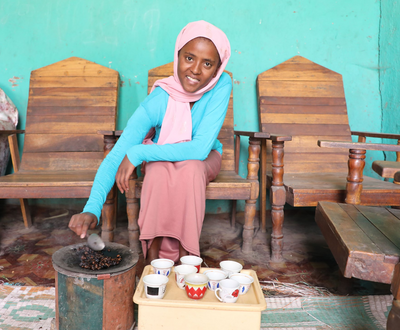
Semira in Ethiopia: breaking the bond of harmful traditional practices
From the moment she could carry a bucket, Semira would gather the water, cook the food, and collect the firewood for their family. Her three brothers would play with their friends, or relax under a tree. None of them thought anything of it – it was one of the things that was often expected of girls in her community, along with others like girls being forced to marry a man who had abducted them instead of fighting the crime, or having their genitals “cut” by a traditional practitioner to protect their family’s honour.
Everything changed when she was 13. Because of child sponsors, World Vision invited Semira and the other children along with community educators in her community to a workshop to learn about gender-based violence and what it looked like in their community. Semira was shocked as she heard how the traditional practices she had always thought were normal – like child marriage, marriage by abduction, or female genital mutilation – did real and devastating physical, psychological, and social damage to girls. She also learned that she could do something about it. Semira formed a girls’ club with some friends and got to work. Now she is 15, and Semira and her friends are making progress: more children are joining the fight to end harmful traditional practices. Children all over the community report rumours of harmful practices to Semira’s group, who in turn report it to their school directors, and the police. Her work is making a big impact in her community.
“I thought all harmful traditional practices were useful, and I used to respect and protect them like any other community member. I learned that the traditional practices were harming girls. I [decided to] give my time to fight the practices and make the community aware of the health, physical, and psychological consequences for the future of girls. We teach about the impact of early marriage and female genital mutilation once every week at our school and we also travel from school to school. When there is a big community gathering, we teach about the effects of the practices through poem, drama, and music. This is the most important thing I can do for my generation. I have dedicated my life to fighting and eradicating harmful traditional practices. Girls have a role to play like any other citizens in the development of their country. I hope and wish to see girls in leadership places.”
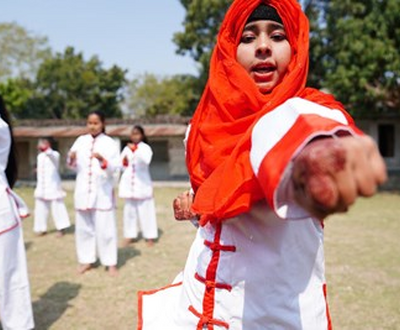
Shila in Bangladesh: breaking the bond of early marriage
14-year-old Shila enjoyed attending school, and when World Vision started a karate training program for girls in her community in Bangladesh, she was eager to enroll. The programme lasted six months and was designed to help girls develop the confidence to protect themselves against violence, which runs rampant against women and girls in their area. As she learned, she grew full of energy and courage.
But life was difficult in other ways. Shila’s family was poor, and her parents struggled to provide. When a marriage proposal came, Shila wanted no part and refused. Rumours began spreading throughout the community and her family’s reputation began to take a toll. Her parents took the choice off the table and said she was getting married, but her father and father-in-law agreed that they would allow her to continue her studies. It was a small thread of hope for Shila to hang on to. After she was married, Shila’s daily reality went from hard to frightening. Her husband would regularly come home drunk and beat her for no reason. He also wouldn’t allow her to go to school, despite their fathers' agreement. When she protested, things just got worse. Shila was hurt, scared, and frustrated as this was not the life she had envisioned, but she was not defeated.
By using her karate skills, Shila took back some of the ground she had lost and she also wanted to take back her dreams. Her Junior Secondary Certificate exam was fast approaching, and she wanted to rest, focus, and prepare for it away from her husband by staying with her parents. Shila’s aunt helped get her back to her parent’s house, her mother helped her study and prepare for it, and when the day came for her to sit and take it, she passed! While pressure mounted for her to return to her husband, Shila found her voice and stood firmly, knowing education was her path forward. Shila is now 16 and a student in class nine. She has a strong sense of confidence and courage for herself. Shila wants to see other girls find the emotional strength to stand up for their rights and advocate against violence, harassment, and abuse.
“Poverty was there, but I was still content in my family until the day my marriage proposal came. My protest became useless, I was forced to marry. I tried to make my husband understand a few times that he should not behave like this, but it would make him furious, and he used to beat me more. I was tortured and abused if I said a single word regarding studies. Everything has an end, so does my tolerance: one night I raised my voice. When he came to hit me, I grabbed his hand and made him fall on the ground using my karate skill. He got scared, at the same time surprised. After that, he never dared to hit me again. I became adamant that I would never [go] back to this person again. I strongly expressed that it is the divorce that I want from such an abuser. I proceeded with divorce and continued with my studies. Now I feel confident and happy. I encourage other girls [to take] the martial art training and find the courage to protest against violence, and any bad behavior. I want to tell every parent that girls are not the burdens of a family—allow them to become your strength. Don’t marry them off at an early age."
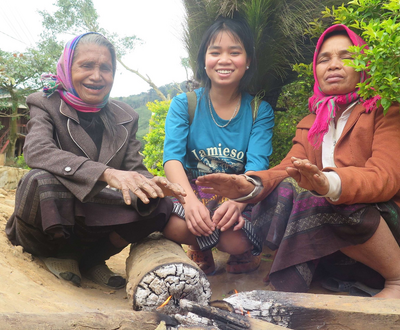
Xa in Vietnam: breaking the bond of generational patterns
Xa is only 14 years old, but for years, she could see her future: early marriage. Both of her grandmothers married at age 15 and her mother at 17. Xa lives in a village in the north-central region of Vietnam and belongs to the Vân Kiều people. In her culture, women are the breadwinners of the family, and at young ages, girls often follow their mothers to the fields to work from morning to night. Here, arranged marriages are still prevalent, and most girls, if they do get the chance to go to school, drop out early. By their early teens, many get married, have children, and start earning a living. It's the way it’s always been. Marriage as a teen seemed inevitable for Xa.
But Xa had dreams. She wanted to go to school and learn, so every day, she walked 10 kilometers each way on a dirt road to make it happen. When one day her mother broke her leg and couldn’t walk or work, Xa worried for her own future. It didn’t take long for Xa’s worst fears to become reality. After they had nothing to eat for several days, her father told her she needed to drop out of school to help the family. She left school and began working in the fields. But it didn’t really feel like a choice. Her sister, six years older than her, had gotten married at 19 and was working in a factory. She also struggled to provide for her family, but knew something that may help: she suggested that her little sister reach out to World Vision for help. The World Vision staff took action and visited Xa’s father. That conversation changed everything for Xa. She returned to school in grade 10, and boarded with friends who lived closer during the week so she didn’t have to walk so far. That left the housework for her father to do. But World Vision came around the family and helped them. With support from her child sponsor, Xa got help with daily essentials and her boarding costs, while training for her father on how to breed chickens meant the family could have eggs to eat as well as to sell for income. Xa got the chance to learn too - she learned about decision-making skills and how to protect her rights. Now Xa wants to help be a part of change in her community: she’s set her sights on becoming a policewoman who protects children from harm.
“I was so scared that I would fall into the same destiny as my mother: get married at a young age and find myself a drunk and abusive husband. My heart was heavy. That was the moment that I knew I had to make a decision: falling back to the same pattern of struggling like the generations of women before me or making a difference. I missed being innocent, going to school, doing my homework, working hard for a good grade. I cried with my sister over the phone every time we talked. I felt like [Sáng, the World Vision coordinator] understood me more than anyone else, more than my father. More importantly, he put my future and my well-being first… Something so sincere and earnest in his words changed my father’s mind. Though still slightly reluctant, he decided to allow me to go back to school. Since then, I have once again realized the power of education in one’s life. Only education can bring me away from the old-fashion customs. I heard from somewhere that ‘it takes a village to raise a child’, but to me, it is more like ‘it takes a village to protect a girl’.”
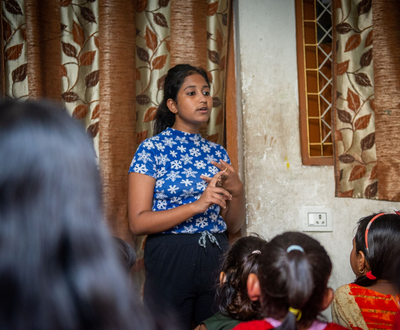
Sudha in India: breaking the bond of violence against girls
Sudha’s family lives in the bustling city of Delhi, India. Her parents struggled to provide for her and her two younger sisters, and the girls felt the strain. Often, their father wouldn’t let them go outside to play, and the girls would be sad. But the city is a dangerous place for girls — violence against girls is prevalent, trafficking is a constant threat, and many children are forced to work instead of go to school. Sudha was shy and constantly fearful.
But when she was 6 years old, Sudha became a sponsored child with World Vision, and she attended a children’s meeting. Sudha was intrigued. She continued to attend the programme’s activities, where she learned about her rights and began to grow in confidence. Then she joined the children’s parliament, a forum where children discussed ideas and formulated action plans.
Sudha now uses her voice to speak up for other children in her community. Working with the Child Protection Unit since the pandemic began, she convinced the parents of one girl who had been sent to work in a factory to send her back to school, and she helped another girl’s father to understand the harm he was doing in beating her and decide to change his ways. Sudha is now a change agent in her community helping to tackle the biggest challenges that girls in her community face.
“I felt involved in something big and important. I recall thinking 'What can I achieve alone by myself? Or what can I achieve being a girl?' I used to feel odd speaking out loud earlier, but not anymore. I questioned why these things happened more with girls or women, while boys didn’t face them. Girls should be made aware. When I learned about our rights and all that we can do, I went and shared it with other girls and women.”
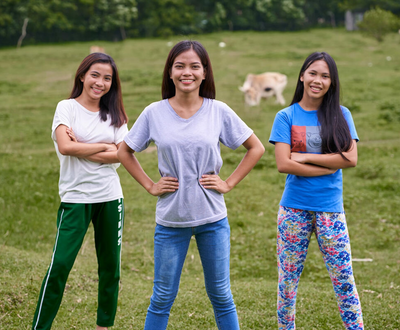
Michaela in the Philippines: breaking the bond of online sexual exploitation
Like most young people, Michaela has grown up in the Philippines using the internet on a regular basis. In her country, while online learning has become a norm during the pandemic, online sexual exploitation of children has been on the rise. But Michaela won’t be a victim.
As a sponsored child, she has learned how to protect herself online, and she’s doing everything she can to help protect other kids too. She says a lot of children don’t understand how powerful the internet can be. Michaela makes posters and holds group discussions under a tree in her community, and she invites other children to come learn how to stay safe online. As she looks toward the future, Michaela hopes to become a teacher—which should come naturally since she’s already well practiced!
“They think that everything online is okay. This is not good. Sexual exploitation can start when young people are naïve. My sister is my inspiration and role model: we've both been sponsored, and she was a World Vision child leader. I observed what she did with World Vision in school, and decided to do the same.”
1,000 girls are waiting
Thousands of girls just like these are waiting to break down the barriers standing in their way.
Sponsor a girl by October 11, International Day of the Girl and join the movement for change.